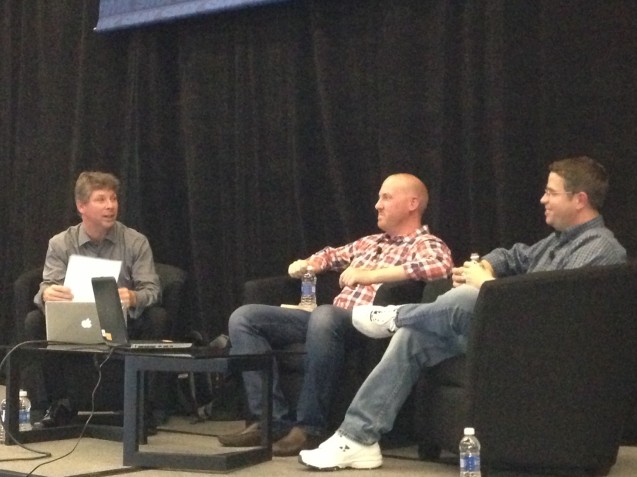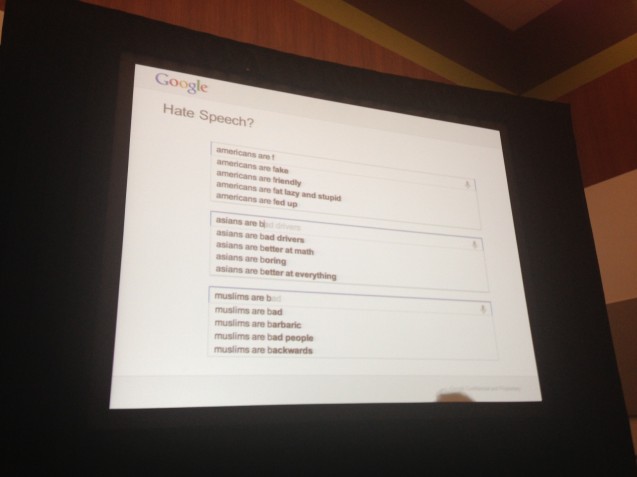Today Matt Cutts is on stage at SMX West. We’re live blogging here as Matt Cutts teach us with dealing with tough calls in organic search.
Matt Cutts starts off asking questions:
Should Google censor the internet? – 1 person raises it’s hand. Assuming that, should Google show child porn? There is a fine line between doing what’s right and giving people exactly what they want.
Person writes a suicide note and posts it online before committing suicide. The family sees it online as it’s the #1 search result for the persons name, and asks for it to be taken down. Should Google take the note down. Cutts asks if they should take it down… 50/50 in the audience.
What should Google deal with to deal with these situations. They want to organize the worlds information and present it. There are a lot of bad things, like child porn and many other horrible things.
They’ve set up guidelines. Here is what they want to be:
- Comprehensive
- Algorithmic solution preferable to manual actions
- Not to push live shocking of offensive content to users unless they’ve signalled that they want it
- Help users avoid fraud by removing info that info
In order to help with this they’ve released “How Search Works”
But, there is violent and shocking content, where do we draw the line? We’re going to go through 2 examples of questionable content.
#1 Thin person (extremely thin and not healthy)
#2 Dead bodies in Syria
What should Google be filtering from their search results? Audience yells, “Leave it up to the user” Cutts says that’s why they introduced “Safe Search” What should be in there? Porn is pretty obvious. But what about pro bomb making sites? What about pro anorexia sites? Should those be put into the Google search results? Serian war footage with dead bodies could be graphic but it’s also telling history.
Google feels very uncomfortable filtering these results. They aren’t sure what to do here.
Next: dealing with disputed facts.
Google isn’t going to not serve news. So if someone posts that someone landed on the moon today, their system isn’t going to fact check. Especially when it’s posted on very reputable sites.
If the Government tells you that a fact isn’t true but tons of people are telling you that it’s true. What do you do? Question from Audience: Do you take it down in just that Country, what about in all Countries? – You could go to jail if you don’t. What does Google do about censorship?
There isn’t a right or wrong answer in this situation. But these types of situations happen on a daily basis. Are we archivists or activists? People might be arrested because of the info we put up or don’t put up.
Next, hate speech.
On the front page of the search results was a white supremacy sites, people aren’t fact checking and linking to sites they shouldn’t. Would you say that should be in the search results? Should we go with what people are linking too or just the intent of the users. We don’t want to push shocking content out there like this cause tons of people are pushing it. These are relevant sites but against them. What do we do?
We can’t vouch for everything? It looks organic…cause it is.
What about this?

People are searching for these on the internet, should we filter those? Do we have a responsibility to look at those or not?
Matt Cutts talks about search results for people. Google does try and goes against extreem hate speech, porn and a few other violent searches. There are a few other weird things.
Some people that might love search results while other might be offended by the same thing. For example: Matt Cutts Blackhat is one of Cutts’s top search results. He’s pissed about this but it’s what people are searching for. Is it offensive to him, yes. Should Google not show it because of that? It’s a hard thing to do.
Google tries to be as close to an archivist as possible with a light touch.
They try and veer toward the algorithmic and have a light touch on everything else out there.
Question from audience: Can I filter my own search results (suggested searches) and look at other signals? That’s something that Google is trying to do.
Next: Personally identifiable information.
Nude photos of myself that is sent to an ex and posted online. Should Google remove them? What about a picture of George Bush falling off a Segway and George Bush asks Google to take it down? Isn’t that the same thing? What should they do?
Even Eric Schmidt asked to have his house taken down off Google Maps, Google told the CEO No because they felt it was what the users want and under the best user experience.
Google is trying to clean up the SERPs space. Trying to make sure to clean up spam out there.
What happens if a persons social security number is online? Should we keep that up? What about bank account numbers put online by someone pissed at a company?
Next: What about fake pictures?
A persona puts a picture of a fake picture of you, should we take it down? We’re not perfect, and trying to make sure the news is possible. We’re penalizing people that are trying to take advantage of this.
Hopefully people have come in and realized that there is a nuance to this. We don’t have the perfect answer. We’re trying to give the best user experience. We’re trying to display the content and archive the whole internet. Not police it.




